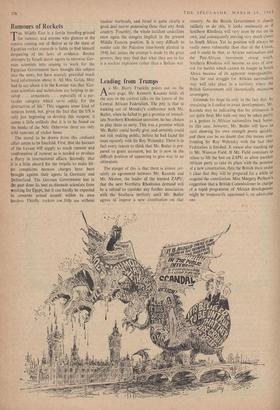Rumours of Rockets
HE Middle East is a fertile breeding-ground I for rumour, and anyone who glances at the reports coming out of Beirut as to the state of Egyptian rocket research is liable to find himself despairing of the laws of evidence. Recent attempts by Israeli secret agents to terrorise Ger- man scientists into ceasing to work for the Egyptian Government have brought this subject into the news, but have scarcely provided much hard information about it. All Mrs. Golda Meir had to say about it in the Knesset was that 'Ger- man scientists and technicians are helping to de- velop . . . armaments . . . especially of a par- ticular category which serve solely for the destruction of life.' This suggests some kind of neutron bomb, but, given the fact that the US is only just beginning to develop this weapon, it seems a little unlikely that it is to be found on the banks of the Nile. Otherwise there are only wild rumours of rocket bases.
The moral to be drawn from this confused affair seems to be fourfold. First, that the bazaars of the Levant will supply as much rumour and confirmation of rumour as is needed to produce a flurry in international affairs. Secondly, that it is a little absurd for the Israelis to make bit- ter complaints because charges have been brought against their agents in Germany and Switzerland. The German Government has in the past done its best to dissuade scientists from working for Egypt, but it can hardly be expected to condone armed assault within its own borders. Thirdly, rockets are little use without nuclear warheads, and Israel is quite clearly a good deal nearer possessing these than any Arab country. Fourthly, the whole incident underlines once again the dangers implicit in the present Middle Eastern position. It is very difficult to render safe the Palestine time-bomb planted in 1948, but, unless the attempt is made by the great powers, they may find that what they are in for is a nuclear explosion rather than a Balkan war.














































 Previous page
Previous page